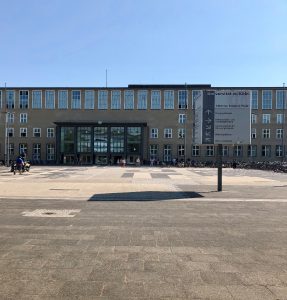
September 19, 2018, by lzzeb
UK economic geography on the move at the Fifth Global Economic Geography Conference, Cologne, 24-28 July 2018
A blog by Professor Sarah Hall
It is an interesting time to travel to attend international conferences as an economic geographer, working in a geography department, in the UK. Of course, there are longstanding debates that are by no means specific to economic geography concerning the place of the international conference in academic work. Indeed, the environmental sustainability of international conferences themselves are frequently queried. Moreover, as my colleague Shaun French has recently explored in this blog, academic travel relies on a whole set of external underpaid and frequently un-paid forms of labour outside of the academy. This was all too clear to me as I put the necessary plans in place with family and friends to attend the Fifth Global Economic Geography Conference in Cologne amidst constant questioning from my young children as to what the conference was and why I had to travel to Germany to attend it. In answering these questions, I was also reminded of the benefits and privileges attending conferences brings, the opportunities to (re)connect with colleagues and forge energising new conversations.
However, I was also preparing to attend the Cologne conference at a time when important and urgent questions were being asked about the state and future trajectory of UK economic geography. These are distilled most clearly in a report written for the Economic Geography Research Group of the Royal Geographical Society with the Institute of British Geographers (RGS-IBG) by Al James and co-authors which has subsequently become the subject of a commentary and a series of responses in Environment and Planning A (See pieces by Trevor Barnes, Ron Martin, Andrew Leyshon, Dan Cockayne, Amy Horton, Kelly Kay, Jessa Loomis and Emily Rosenman, Andy Cumbers and Andres Rodriguez-Pose). At its heart, this report and associated commentaries are concerned with exploring the scale and rationale behind the growing migration of self-identified economic geographers from departments of geography to business and management departments in the UK. The report identifies a number of push and pull factors ranging from the position of geography within UK higher education institutions to the remuneration and wider packages of support available to economic geographers on arrival in business schools based on detailed and highly original empirical quantitative and qualitative research with economic geographers ‘on the ground’. In so doing, the report, and associated commentaries, raise vital questions about the nature of UK economic geography, its intellectual focus, who it is practiced by, to what ends and where.
It was against this backdrop that I set off to Cologne with the support of a travel grant from the School of Geography at Nottingham, keen to learn more about the different perspectives on UK economic geography. Through participating in these conference sessions, informal discussions and the Annual General Meeting of the Economic Geography Research Group (EGRG) of the RGS-IBG, two key areas of debate emerged that, for me, are vital in understanding the current state of UK economic geography and its possible future trajectories. First, the need for economic geographical analysis and understanding of the world we live in has never been stronger (see also Trevor Barnes’ response to the original commentary on this). It is clear that several of the most profound questions and challenges being posed to the contemporary world economy are intrinsically geographical in nature and these were the subject of papers and wider discussion at the conference. This includes the ways in which boundaries are being redrawn through processes ranging from Brexit in the UK and EU to China’s ambitions to reshape global geo-economic and geo-politics through its Belt and Road Initiative. This renewed interest in the geographical constitution of economic life is also reflected in funding calls that increasingly note the need for geographical analysis. Perhaps most notably in this respect in the UK is the Strength in Places fund within UK Research and Innovation (UKRI) that takes seriously the place based, and often locally driven nature of innovation and the associated economic benefits that can stem from this. In this respect, the question becomes how can economic geographers respond to these challenges, demonstrate the value of a geographically informed analysis and effectively outline what an economic geographical approach can bring to these research questions. In this respect, for me, it matters less where the research is taking place but more that economic geographical research is being undertaken and speaks to the urgent social scientific research questions that we are currently facing.
Second, and following on, I didn’t experience UK economic geography as being somehow moribund at the conference. Far from it. UK economic geography, in various guises and from different disciplinary ‘homes’, was being presented and discussed and there was a strong representation of economic geographers working in UK higher education institutions, be that in geography or business and management departments. This points to the vitality that can be found through a diverse community of economic geographers who work across different empirical sites, disciplinary homes and theoretical frameworks. However, this diversity and cross-disciplinary nurturing of research approaches undoubtedly poses challenges when it brushes up against a higher education system that for all the talk of inter-disciplinarily continues to operate largely along disciplinary lines. For me this is at the heart of the challenge facing contemporary UK economic geography. Economic geographies, and the study of them, are by definition comprised a series of diverse relations but these overflow institutional framings of geography. Creating the space to develop these networks will be central to the ongoing development of UK economic geography. Conferences, such as the Global Economic Geography conference, will be central to this project. It is in this spirit that I’m looking forward to following up these debates at the upcoming meeting of the Economic Geography Research Group of the RGS-IBG in November 2018.
No comments yet, fill out a comment to be the first


Leave a Reply